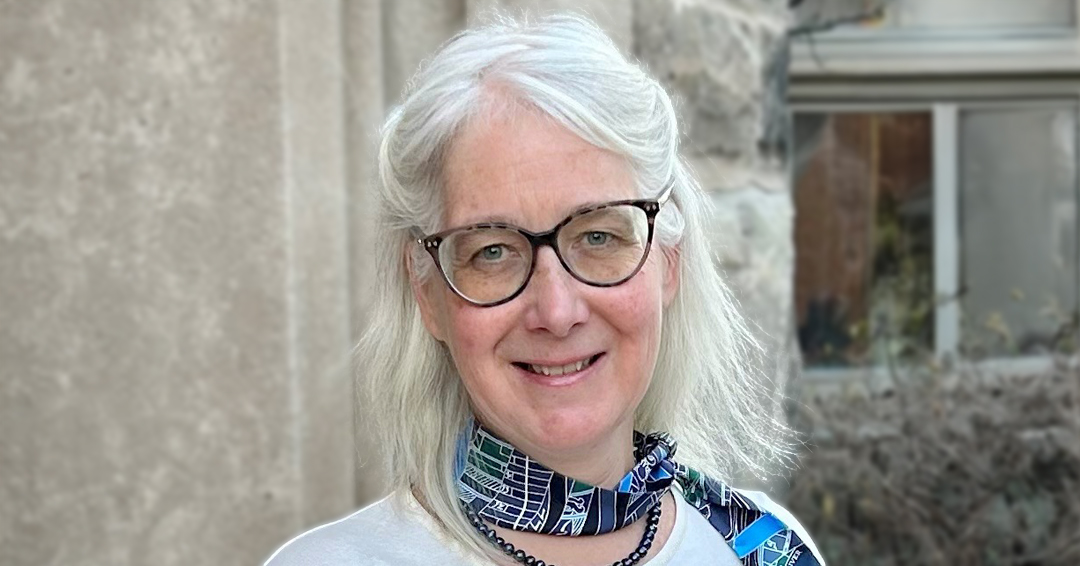
Part of our series: FMHS community members from away – The Faculty of Medicine and Health Sciences (FMHS) is made up of diverse communities, including people from across Canada and around the world. This series recognizes those from outside the province who have chosen to bring their talents and expertise to McGill University. Thank you for all that you contribute!
Heather Purdie navigates two worlds with remarkable dexterity. While her role as Administrator and Assistant to the Vice-Dean, Academic Affairs at McGill defines her professionally, her volunteer work shapes her community footprint in Montreal. Heather’s commitment to advocacy stems from a deep-rooted and very personal impetus to help women in need.
Cross-cultural horizons
Born in Scotland, Heather – equipped with a master’s degree in Public Health and Health Services Research and nine years of experience as a music therapist in Britain, moved to Switzerland and then Canada. These moves immersed her in French-speaking environments. Embracing her new surroundings, Heather noted how learning the local language “is the key to successfully integrating into a culture.”
In Montreal, Heather welcomed the challenge of working in French for the first time, finding it a fun and new experience. Eventually, she joined McGill University in her current role. Beyond professional fulfillment, Heather found a sense of belonging in Montreal, appreciating the city’s diversity and acceptance. “Everybody just accepts you for who you are,” she explains. “Nobody needs to know anything about your past. They just accept you and that was very liberating for me in many ways.”
Voices rising
Having settled into Quebec, Heather chose to leverage her personal experiences to support those enduring hardships she understands all too well. Heather’s commitment to organizations like Logifem, an organization assisting women experiencing homelessness during their post-shelter transition, and the Rapha Project, a grassroots, community-based initiative studying domestic violence in Quebec’s faith-based communities, is rooted in empathy and her own survival journey from violence.
These organizations prioritize the involvement of women with lived experiences, an approach Heather fervently supports as she believes in the power of sharing survivor stories to offer vital support and build societal consensus. “It means a lot to me because as a survivor of violence myself, I care about creating environments where women and girls can flourish,” Heather shares. “If someone had talked about it even 10 or 15 years ago, my life would have been very different. Probably because I didn’t even realize what was happening to me.”
Heather underscores the significance of survivor involvement in advocacy. “I think that those of us who have walked down that road and who are able to talk about it, help to open the door for other people to be able to acknowledge that this is something that happens, that it’s hard sometimes, but that there is help, and there are people out there who understand.”
Homes for women
Heather has served as Vice President of Logifem’s board since June 2023. She also participates directly in the shelter’s weekend activities, spending time in the kitchen, serving food and engaging with both clients and staff.
Recognizing the limitations of temporary shelter living, Heather emphasizes the critical need for these women to secure permanent homes, as stability is scarce in transient situations. She notes the complexity of addressing homelessness, highlighting factors such as hygiene, security, dependent children, and especially violence, which require careful consideration in seeking solutions. “It continues to be important in society to talk about conjugal violence and homelessness for women,” she asserts.
Shedding light on hidden struggles
Passionate about challenging societal norms, Heather also applies her research and qualitative analysis skills to the Rapha Project. Inspired by a similar study conducted in England in 2018, the project has garnered over 500 responses and conducted 13 survivor interviews. Heather explains, “I thought it would be really fascinating to replicate the study in Quebec, but what I didn’t want to do was just import a model from outside of Quebec and think that that’s just going to work here. And so that’s why we took at least two to three years to really go through the process of figuring out what would this look like in the context of Quebec.”
Related:
